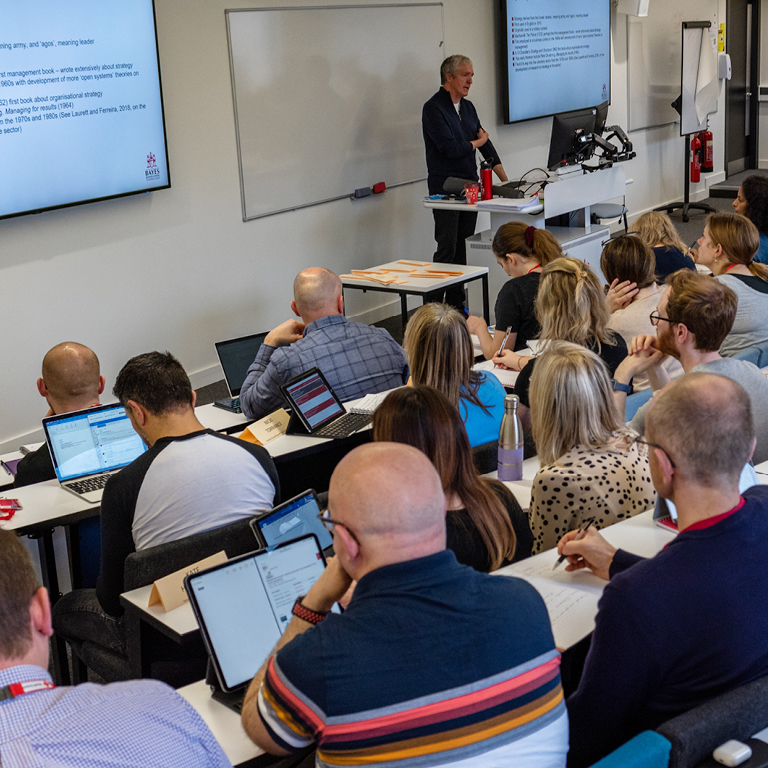Charity Accounting and Financial Management MSc | PGDip

Key information
Duration: 12 - 24 months
Attendance mode: Part-time
Fees: From £7,250 (PgDip) (more information)
Location: Bunhill Row
Start of programme: October 2024
Application deadline: Rolling applications
Entry year: Showing course information for 2024
One of the only MSc courses in Europe to focus on charity accounting and financial management
Overview
Charity Accounting and Financial Management MSc | PGDip Who is it for?
You may already be working in charity finance, as a manager or consultant, or aiming to move into this demanding role in the sector. Either way, this academically rigorous course will match your needs. It will also equip you for a role as an advisor, auditor or independent examiner to a charity.
You will gain a well-rounded understanding of the role and the knowledge and skills to develop and apply your financial expertise in the sector.
Why choose this course?
Techical & practical
Blend of practical knowledge from those working in the sector and relevant, current theory.
Start in April or October
We offer a part-time 9 months PgDip /18 months MSc course (April) or 12 months PgDip/two year MSc course (October), study alongside your job.
Course objectives
Under scrutiny from regulators, trustees and supporters, charities must exercise the highest level of financial governance. This course equips you for that unique challenge. Combining the academic rigour of an internationally respected business school with a highly practical and applied approach, it
is tailored precisely to the issues facing senior managers in the third sector.
You will be taught by an academic team who understand first-hand the tools and techniques for effective financial management of charity income and assets. Guest lecturers will present their thoughts on the real-world challenges placed on charity finance managers. Your course includes a fieldwork exercise.
This will give you a deep insight into the practical realities of charity financial management in another organisation.
Teaching staff
Professor Paul Palmer

Other teaching staff include:
- Andrew Hind, a Visiting lecturer in Charity Governance and Finance. Previously the Chief Executive of the Charity Commission with director roles including Barnados and Action Aid.
- Mark Salway has worked to form financial strategy and growth plans for CARE International, Depaul, Tomorrow's People, Edexcel, The Children Society and Cats Protection.
- Karen Thompson has worked in the not for profit sector for over 15 years, as a Finance Director, Chief Operating Officer and also as an Assurance & Advisory partner in some of the top 20 firms.
- Alex Skailes is a Director at Bayes and leads Bayes' Centre for Charity Effectiveness. She is an experienced strategy and finance director with a successful track record of advising and leading clients in the nonprofit and private sectors.
Accreditation details
The programme is accredited by the Institute of Chartered Accountants of England and Wales (ICAEW). Students will be eligible for the Institute's Diploma in Charity Accounting (DChA) upon completion of the Bayes Postgraduate Diploma.
The Charities Master's courses were accredited by the; Nonprofit Academic Centers Council (NACC) in January 2019 as the only programme in Europe to be included in the first group reviewed. NACC Accreditation fosters third sector academic programmes worldwide.
Course content
The MSc course is taught on a part-time basis over a period of two years (20 months for those eligible to enrol on the April Intake). Students initially enrol on the Postgraduate Diploma with the specialist area of their choice, and confirm their intention to complete the MSc at the end of the first year.
- Develop your understanding of the strategic issues and organisational challenges facing charity organisations and their managers within the finance function
- Build relevant management and leadership skills, and analytical capabilities
- Acquire insights into the different strategies and approaches commonly adopted by charities
- Deepen your appreciation of the issues of managing change in the finance function
- Gain access to a strong network and connections within the charity sector
- Build your confidence as you pursue your career in the sector.
Duration
For October entry
- 12 months (PgDip)
- 24 months (MSc).
Course structure
Programme content is subject to change. We regularly review our module offering and amend to keep up to date and relevant.
Induction weeks
The Charities programme courses starting in October will have a final session for the in-person registration followed by an Induction Programme.
Modules
Learning and Understanding the Voluntary Sector (10 credits)
This module represents the starting point for you and the opportunity to learn about the process of learning and establishing plans for learning on the programme. It also offers a perspective on leading public/voluntary sector debates within an historical context, alongside a more enduring understanding of scholarly approaches to the understanding of developments and changes in the relationship between government and the voluntary sector.
Strategy, Diversity and Governance (20 credits)
This module aims to enable you to develop a broad knowledge and conceptual base in the field of strategy development, diversity and governance.
Marketing and Fundraising (10 credits)
This module aims to provide you with the concepts, underpinning knowledge, skills and techniques to plan and develop marketing and operations systems and enable students to analyse marketing needs, evaluate marketing plans, in the context of applying marketing concepts to their own organisation.
People Management in the Voluntary Sector (10 credits)
This module provides an appreciation of key aspects of voluntary sector human resource issues, including the critical issue of volunteer management. The module critically examines the origins and meaning of HRM as well as contemporary debates in the field of strategic Human Resource Management, including recruitment and selection, the psychological contract and HRM at strategic and operational levels.
Charity Accounting and Finance (20 credits)
This module aims to provide you with an understanding of the specialist charity accounting framework grounded in trust law and fund accounting principles and issues of financial management..
Fieldwork Exercise (20 credits)
In this module you will undertake a 'tailored' learning experience centred on a 5 day consulting assignment on a financial project within a charity.
Advanced Charity Accounting, Audit and Taxation (15 credits)
This module aims to provide you with advanced knowledge of charity accounting, audit and taxation principles and practice requirements.
Voluntary Sector Financial Management (15 credits)
This module aims to provide you with an in-depth grounding of the principles of financial management applied to the charity sector.
MSc conversion
Upon successful completion of the diploma, you will be given the option to continue to the MSc. This requires completion of the Research Methods for Managers module. This can be followed by a further six months of personal, supervised research and the presentation of a 15,000-word dissertation.
Alternatively, you can opt to take a taught Masters which allows you to choose specialist modules from one of the other Charities programmes.
Assessment methods
The Postgraduate Diploma consists of five core modules that all students take and are common to all the five charity postgraduate courses. These core modules provide the essential underpinning of management skills for the specialist modules. Upon successful completion of the diploma you can continue to the MSc Programme.
The MSc requires completion of the Research Methods for Managers module. This is followed by either: a further six months of personal, supervised research and the presentation of a 15,000-word research-based dissertation. Or alternatively, you can opt to take a taught Masters which allows you to choose specialist modules from one of the other charities programmes.
Assessment methods
Term dates
October 2024 intake - standard route
| Schedule | Date |
|---|---|
Induction | 03 October 2024 |
| Learning and Understanding the Voluntary Sector | 04 - 05 October 2024 |
| Strategy, Diversity and Governance | 08 - 09 November 2024; 08 - 09 December 2024 |
| Marketing and Fundraising | 10 - 11 January 2025 |
People Management in the Voluntary Sector | 07 - 08 February 2025 |
| Charity Accounting and Finance | 07 - 08 March 2025; 04 - 04 April 2025 |
| Advanced Charity Accounting, Audit and Taxation | 16 - 17 May 2025; 06 June 2025 |
| Exam* | 04 July 2025 |
| Voluntary Sector Financial Management | 07 June 2025; 18 - 19 July 2025 |
| Fieldwork Exercise | Process to be completed by early August 2025 |
| Course Review Day | 08 September 2025 |
*All other modules are assessed by coursework.
Term dates For students progressing from the Postgraduate Diploma Intake in 2023
| Schedule | Date |
|---|---|
Research Methods for Managers | 23 - 24 January 2026 |
Dissertation or Taught Masters Option | Completion by mid-September 2026 |

Fees & funding
UK/Home/International fee
October 2024 entry
£7,250
PgDip
An additional fee to convert to the Master’s degree*’
Tuition fees are subject to annual change.
The fee for the Postgraduate Diploma is £7,250 for the 2024/25 academic year of entry. A deposit of £400 is payable on acceptance of a place. For self-paying students, the balance is payable in two instalments, the first during the registration process September and the second at the end of January.
*The fee for those converting the Diploma to MSc is a further £4,200 in 2024/25 and is payable in one instalment at the beginning of the second year. The conversion fee for the following year of entry will be subject to an annual inflationary increase.’ (there will be a line break once live, just not in the examples below.
Tuition fee increases
Where applicable, tuition fees for Bayes' programmes will be subject to inflationary increases in each year of study. Our policy for these increases is set out in our terms and conditions of study.
Scholarships & bursaries
Students sponsored by their employer will need to complete a form. We also recommend looking at the government PG loan for funding.
Scholarships
Charity Accounting students may be eligible for a scholarship from the Eastside Primetimers Foundation, application for this scholarship will open shortly.
View our scholarships and fundingOther funding opportunities
You may wish to look at the PG Loan option for funding.
View other funding optionsSponsorship
Students on the course who are sponsored by their employer will need to complete a sponsorship form as part of the application process. This can be completed for the Postgraduate Diploma or the MSc. An invoice for the full fees for the academic year will be sent to the employer in October for the Postgraduate Diploma. If the employer is a charity, they can request payment in two instalments by contacting the person named on the invoice. This arrangement allows the charity to spread the fees across two financial years.
View our sponsorship guidanceCareers
Students are selected on their professional experience, and generally continue working in their full-time role whilst undertaking this course.
Past students have come from a variety of organisations, including business and the public sector.
"Those leading the course are some of the most insightful and experienced practitioners in the charity industry."
- Darren Wall
"I wanted to experience a professional course at one of the world's leading Business Schools that delivered both technical specialism and more generalist leadership and management training across all the areas relevant to running a professional not-for-profit organisation. The course offered both extremely relevant and current theory, but also very practical knowledge from those working in, or running such organisations."
- Tom Bilton, Global Finance and Operations Manager, PEAS
"I came to the Charity Finance MSc as a mature student, wanting to move from being a commercial Finance Director into a portfolio career, and since graduating, have achieved that. As well as working in a consulting capacity, I have recently become a Trustee and Treasurer of a high profile charity, which I would never have been able to do without the MSc behind me. And the breadth of modules on offer meant that I ended up with a taught Masters rather than writing a dissertation, which had been my original intention."
- Nicola Silverleaf, Treasurer, CLiNKS
" I recently made the transition from the public sector to being a Finance Director in the Charity Sector. In advance of this, I completed the PgDip in Charity Accounting and Financial Management. I think I gained both from learning about the overall framework for charities in the UK and the current issues facing the sector, and from learning the specifics about the accounting rules and disclosure requirements for charities. Having this knowledge gave me the confidence when trying to find a job and, I believe, helped convince the trustees of my charity to appoint me. The knowledge gained on the course has also helped me settle into my new role fairly quickly."
- Elizabeth Dymond, Director of Finance and Corporate Services, The Charity for Civil Servants
Entry requirements
All students will be highly motivated graduate-level people who bring a wide range of professional competencies, skills and experience from a wide range of backgrounds.
In general we ask for a good first degree, normally an upper second-class honours degree from a British University or a relevant professional qualification: e.g: ACCA, CIMA, ICAEW; ICAS and three or more year’s relevant experience at a senior level. In exceptional cases we will also accept those without a degree but with significant work experience. Provided you have more than three years relevant experience, two professional references are acceptable.
English language requirements
In order to participate fully in the collaborative learning process all students who have not previously studied in English must sit an academic IELTS or TOEFL iBT exam.
The minimum required academic IELTS level is an average of 7.0 with a minimum of 6.5 in writing and no less than 6.0 in any other section.
We require a well-balanced overall score of at least 100 and no less than 25 in the Writing section in the TOEFL iBT test or the TOEFL iBT Home Edition test.
If you are not a native English speaker but have been working in the UK for the last three years it is unlikely you will need to take the test.
Apply
The PgDip/MSc Charity Accounting and Financial Management course has two separate entry points each year.
The intake for the nine months Postgraduate Diploma in April each year for applicants who have gained a CA qualification through one of the five CCABs.
The intake for the 12-month Postgraduate Diploma in October each year is relevant for all other applicants.
Apply here for October 2024 entry. See the 2023/24 course page for April 2024 entry.
Students are able to continue to the Masters from either start date.
Apply for October 2024 Entry
October 2024 entry lies within the 2024/25 academic year.
Terms and conditions
Students applying to study at Bayes Business School are subject to City, University of London's terms and conditions.
Student life
We are located right in the heart of London. Being a student at City allows you to take advantage of all that London has to offer.
London is continually ranked as one of the 'Best Student Cities' in the world to study within (QS, 2019).
Contact us
Speak to one of our staff from Master's programmes teams.
